This website uses cookies so that we can provide you with the best user experience possible. Cookie information is stored in your browser and performs functions such as recognising you when you return to our website and helping our team to understand which sections of the website you find most interesting and useful.
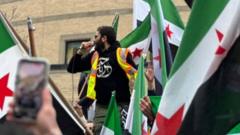
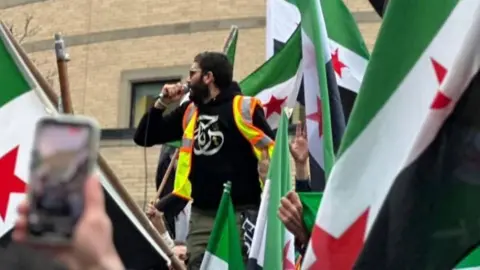 Khaled Abdulwahed
Khaled AbdulwahedIt started with just a small group gathered in Mississauga's Celebration Square, rejoicing that 10,000 km (6,200 miles) away, the Syrian city of Homs had fallen to rebel forces.
But when news broke that President Bashar al-Assad had fled the country, putting an end to the country's civil war, this town square in a small Canadian city became flooded with people celebrating, many of whom had fled Assad's regime for Canada just a decade ago.
"I was crying for more than 45 minutes," said Khaled Abdulwahed, a 31-year-old Syrian who resettled in Toronto when he was just a young man and helped organise Sunday's impromptu event.
Now a Canadian citizen, Mr Abdulwahed - who was 17 when he first participated in anti-government protests in Syria - has continued to advocate for the human-rights of his country, which has earned him the title of the "Syrian mayor of Toronto".
While many have begun to plan trips to see family and friends, they have also shared how Canada will, for most of them, remain home.
"Right now, is our turn to help our people, to rebuild our country and to support them from here," he said.
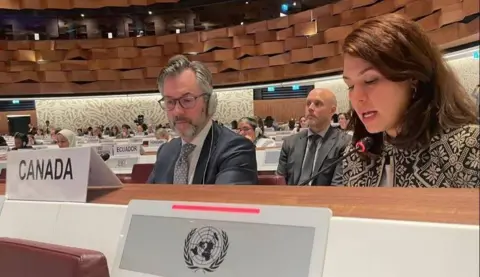 Muzna Dureid
Muzna DureidMr Abdulwahed was part of a wave of Syrian refugees who came to Canada between 2015-2016, backed by a campaign promise from newly elected Prime Minister Justin Trudeau to help resettle 25,000 Syrians at a time when many were dying trying to flee their country.
Canada's warm welcome stood in sharp contrast to their neighbour's to the south, where Donald Trump was running his first presidential campaign on a promise to ban Muslims from entering the country. He would later try to ban immigration from seven Muslim-majority countries.
Like Mr Abdulwahed, Muzna Dureid was forced to make the journey to Canada by herself when she was a young woman.
Within the first three months of the revolution, the then-21-year-old witnessed her brother's arrest, her social media accounts hacked by Assad intelligence officers and an uncle's assassination for his pro-democracy activities.
"This was the tipping point," she said on a call from her older brother's new home in Spain. He was released a year after the arrest, but the family had by that point fled Damascus and spread out across the world.
While Ms Dureid's parents stayed in Saudi Arabia, she managed to secure a fellowship in Turkey before landing another one in 2016 to study in Montreal.
A call-out on Facebook for a couch to stay on soon transformed into a lifelong bond. The Quebec family who put her up for that first night - and continued to for that first year - would later go on to privately-sponsor the rest of her family to join her in Canada.
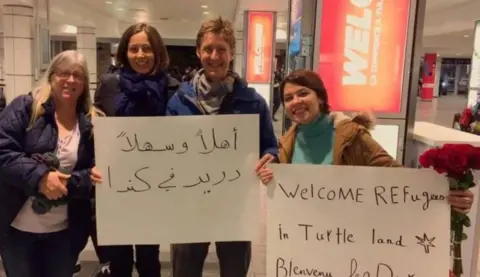 Muzna Dureid
Muzna DureidSince 1979, Canadians have helped resettle over 390,000 refugees through private sponsorship - which differs from government-assisted programmes as the cost of resettlement is borne by an individual or group.
As Canada raced to resettle Syrians fleeing the war, it proved to be essential in meeting that goal; nearly half arrived through some form of private sponsorship, according to the Government of Canada.
Canada's has gone on to resettle more than 100,000 Syrians, all through a mixture of government-assisted and private sponsorships.
It is a small number compared to how many refugees countries around Syria - namely Turkey, Lebanon and Jordan - took in since the Syrian civil war began in 2011. But their warm welcome in Canada has helped make them feel like an integral part of their new community, Ms Dureid said.
"This is why people believe they belong to this country, not for a temporary period, but that this is their country," she said.
The human-rights activist and policy advisor, who has worked with Canada's ministry for gender equality, says that now that Assad is gone, she'll likely split her time between Syria and Canada.
"My dream is to have a ministry for gender equality in Syria and be part of this work," she said.
"I think a lot of us are gonna be between both countries and serving both countries equally."
But there are signs that Canada's doors-open attitude has been shifting in recent years, with Trudeau's government moving to reduce the number of permanent residents in the country as it grapples with a persistent cost of living and housing crisis.
It is unclear what effect - if any - this would have on Canada's refugee resettlement programme. In 2023, the country became the fifth-largest recipient of asylum seekers worldwide.
 Maya Almasalmeh
Maya AlmasalmehMaya Almasalmeh, a sociology student at Western University, was just 17 years old when she arrived in London, Ontario with her family in 2016.
In the Syrian city of Deraa, she lost her grandfather - "a second father figure" - along with her home amidst the siege on the city, which would come to be known as the birthplace of the uprising against Assad.
"He stole our childhood," she said.
Being the eldest daughter of seven siblings in an immigrant home, she said, meant that she also viewed herself as a second parent figure to her many brothers and sisters. And that sense of responsibility extends beyond her front door in London.
"Canada is the country that gave us peace, it [gave] me my education and helped me to develop to the person who I am today," Ms Almasalmeh said. But, she stressed, we "will go back" to help "build the new generation."
She goes on to outline in great detail her long-term goals.
"I want to be a social worker, because the people who helped us in the beginning, it was a lot of kind social workers," she explained, noting that her "second home" of Deraa will need people with her skills to rebuild.
But like Ms Dureid and Mr Abdulwahed, the 25-year-old doesn't foresee Syria becoming a permanent base.
"Canada is our home. I would say, it's our heart," she said. "We will never forget how Canada gave us the chance to live happy again."
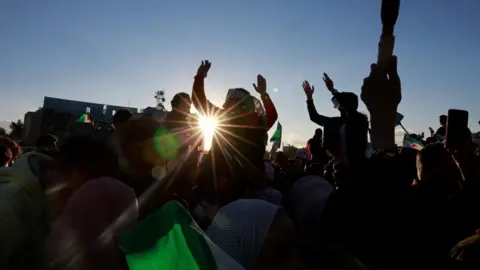 Reuters
ReutersYet some of those celebrating are also exercising a heavy level of caution before booking flights to see distant relatives.
"Edmonton - this is my home. This is where my family is," explained 36-year-old Basel Abou Hamrah, who resettled in the Canadian prairies with his mother and three siblings in late 2015.
Mr Abou Hamrah said there are concerns when he thinks about going back to Syria. Part of his struggles when he first arrived in Edmonton stemmed from the fact that he hadn't yet come out to his family as gay.
There is also uncertainty about what the future holds for Syria, which was liberated by an Islamist rebel group that was once an off-shoot of Al-Qaeda, though it had rebranded itself in recent years.
Questions have swirled on what type of government the group would form, and how much freedoms Syrians will have under this new leadership.
"It's not safe for LGBTQ refugee people back home in Syria," he explained.
Prior to the 2011 revolution, there were reports of gay men being targeted by police.
Mr Abou Hamrah said this is why the news this week, that some European countries are choosing to pause asylum decisions for Syrian refugees, causes him grave concern.
"There are lots of LGBTQ refugees that - no matter what is the new government of the new Syria - they will not be safe," Mr Abou Hamrah said, citing how the situation in the country is still in "flux".
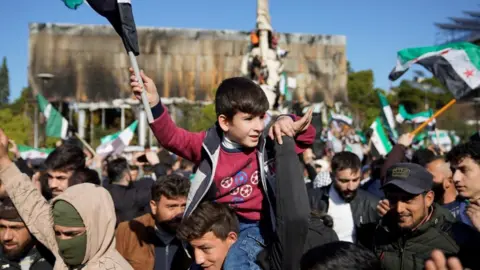 Reuters
ReutersMoving back to Syria on a more permanent basis may be, for others, the news they've been waiting to hear since the civil war pushed them from their homes years ago.
"Canada gave us safety and dignity," explained Israa El Issa, a mother of four, from her home in Prince George, British Columbia. "There has never been a day where I felt like a refugee or not Canadian or unwanted."
She and her family fled Aleppo and were later sponsored out of Lebanon by a group of private citizens on the western coast of Canada.
Up until this week, she had been planning to carry on with her studies in Canada to one day become a nurse. But she said now that's all been put on hold: "God willing I'll finish in Syria instead."
A motivating factor for returning to Syria is an intense feeling of "estrangement" she has felt for the family she left behind, after trying, and failing, to bring her father and mother to join her.
"That's all I wanted," she explained. But her father died from cancer about eight months after she moved. She tried to bring her mom, but said she struggled navigating the system.
"I tried so many times, but no result," she said.
Despite these difficulties, she doesn't begrudge the country that took her in and instead views it as a natural process to want to return home.
"At the end of the day, Syria is our country. And why are we refugees in the first place? Because there was war in our country and it wasn't safe to stay," she said.
"But now that Syria is free from the oppression of Assad, and God willing safety returns to Syria, then of course we will return too."



 Africana55 Radio
Africana55 Radio 

